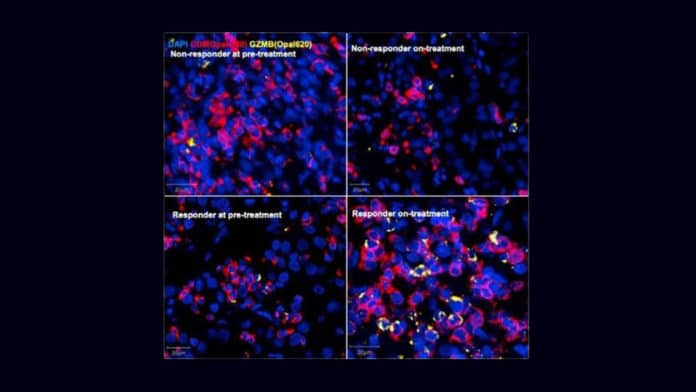Clear cell renal cell carcinoma, or ccRCC, is a type of kidney cancer. It occurs when cells in the kidney quickly increase in number, creating a lump (mass). This type of cancer accounts for around 75% of cases.
Treatments for people with ccRCC include surgery and Immunotherapy. Treatment will depend on how much cancer has grown.
Immunotherapy is the most commonly used treatment, where drugs help immune cells recognize and attack cancer cells. However, this does not always work and, for kidney cancers, there is no way to predict its efficiency currently.
A new study at UCL suggests that immune cell patterns within tumors can help predict if patients with kidney cancer will respond to Immunotherapy.
The study analyzed 115 tumor samples from 15 people with clear metastatic cell renal cell carcinoma who received the immunotherapy drug nivolumab through the ADAPTeR clinical trial.*
Lewis Au, co-lead author, oncologist, and research fellow in the Cancer Dynamics Laboratory at the Crick, said, “Analysing multiple samples from each patient, both from different parts of the kidney tumor and from tumors that have spread to other organs, is critically important. It’s known that molecular information in kidney cancer is distributed like a mosaic within the tumor – such that taking a single sample may not capture all the information needed for a comprehensive analysis.”
Scientists took tumor samples from patients at different stages of cancer treatment: before Immunotherapy, nine weeks after treatment started, after surgery when the tumor was removed, and if the treatment stopped working.
For three individuals, tumor samples were also collected after the patient had died. iThis was enabled through the PEACE post-mortem research program, which provides a unique opportunity to study tumors that have spread to other organs, which are not amenable to be sampled during life.
Scientists observed different tumor characteristics within the samples. They also measured immune responses to see if any corresponded to Immunotherapy. In particular, they observed the number of different mutations present in the tumor at diagnosis and whether specific retroviral components, viral DNA present in the human genome, were expressed.
An increased number of specific ‘clonal’ T cell receptors in the tumor before treatment- was linked to a greater chance of positive immunotherapy response. And if these T cell receptors were maintained during treatment, this was the strongest indicator that treatment would be effective.
Lewis adds: “In people who respond to this Immunotherapy, there is a group of T cells which appear to have already recognized the tumor, through these specific receptors. These cells, with potential tumor-killing activity, are sitting on the tumor, but they need the drug to kick them into action.”
“When T cells bearing these receptors are effectively attacking the tumor, we can see them accumulating within cancer. But in cases where their receptors don’t recognize the tumor, they are replaced by other T cells with different receptors as the immune system tries to find a match that recognizes and kills the tumor.”
“Our study also shows how in-depth studies of cancer biology within clinical trials can be incredibly powerful.”
Dr. Emine Hatipoglu, co-lead author, specialist oncology registrar, and Cancer Research UK clinical research fellow at UCL Cancer Institute, adds: “This study helps us understand why this Immunotherapy sometimes works and sometimes doesn’t. There is a specific T cell response that increases the chance of effective treatment. With this deeper biological knowledge, it might be possible to find new cellular or combination therapies that increase the chance of survival for our patients.”
Dr. Samra Turajlic, group leader of the Crick’s Cancer Dynamics Laboratory and consultant oncologist at The Royal Marsden NHS Foundation Trust, said: “Immunotherapy has transformed our ability to treat certain cancers like melanoma skin cancer, kidney cancer, and lung cancers. But there’s still a lot of research to do to help us understand the precise ways it works and why it’s effective in some patients and not others.”
Sergio Quezada, Professor of Cancer Immunology and Immunotherapy at UCL Cancer Institute, adds: “Cancer cells survive and grow because they have found a way to avoid the immune system. Understanding this process paves the way to developing new and more effective ways to stimulate T cells against cancer cells which hold the key to better treatments.”
The team will continue this work aiming to understand more about kidney cancer and how treatments work.
Journal Reference:
- Lewis Au, Emine Hatipoglu et al. Determinants of anti-PD-1 response and resistance in clear cell renal cell carcinoma. DOI: 10.1016/j.ccell.2021.10.001
